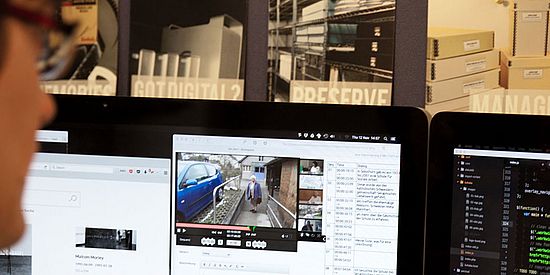
Digital Humanities (Master’s Degree Subject)Humanities for the 21st century
Digitalization is fundamentally transforming almost every aspect of our society, including the sciences. In the humanities and social sciences, digitalization and networking open the door to novel ways of exploring culture and society. The aim of the Digital Humanities study program is to familiarize humanities and social sciences students with these new forms of research.
The Digital Humanities course teaches students how to apply and reflect upon computer-assisted and experimental processes in the humanities and social sciences, combining technological knowledge and methodological skills with problems from research in their respective subjects of study. Students can specialize in one or more subject-related applications according to their interests. The program gives students the opportunity to engage in a wide range of activities in culture and media, science, memory institutions and business.
Focal areas of teaching and research
The humanities and social sciences interpret the testimonies of human societies, their texts and language, their institutions and buildings, their images and music, their films and games, their everyday and extraordinary objects. Digitalization changes the way in which these testimonies are generated, shared and stored, and thereby our understanding of culture and society. This gives rise to new methods of presentation, analysis and interpretation. Moreover, networking creates entirely new ways of combining data and expanding our understanding of culture and society. Typical fields of work in the Digital Humanities therefore include
- data modeling of cultural and social objects and processes,
- editions of cultural and social testimonies,
- creation and structuring of databases, information systems and infrastructure (especially for cultural heritage institutions such as archives, libraries or museums),
- programming and retrieval in large data collections on society and culture,
- creation of corpora and collections for scholarly research,
- statistical and experimental evaluation of data on culture and society.
The Digital Humanities course at the University of Basel teaches theories, concepts and methods of computer-based and experimental research in the humanities and social sciences. As a student, you will learn how to model questions in the humanities and social sciences (particularly in your second master’s degree subject), translate them into digital and empirically verifiable processes, and implement them at the technical level.
The Digital Humanities combine the humanities and social sciences with computer science. Accordingly, Digital Humanities are studied in conjunction with another master's degree subject in humanities or social sciences, such as archaeology, history, linguistics, political science or sociology. The subject does not require a bachelor's degree in computer science, but builds on the knowledge acquired in a bachelor's degree in humanities and social sciences.
Short profile
| Degree | MA in Digital Humanities |
| Type | Degree subject |
| Start date | February, September |
| Credit points | 120 |
| Study structure | The Master's degree is the second degree after the Bachelor's degree and comprises a total of 120 credit points (CP). In addition to Digital Humanities, students choose a second, independent subject, whereby both subjects are studied for 35 CP each. The subject in which the master's thesis (30 CP) is written becomes a major, the other a minor. In addition, there are free electives (20 CP). One ECTS credit point corresponds to approximately 30 hours of work. |
| Subject combination | Students are free to choose their second subject according to their specific interests. Digital Humanities can only be combined with a master's degree subject from the Faculty of Humanities and Social Sciences or the interfaculty master's degree subject Geography. It cannot be combined with other interfaculty master's degree subjects. The free electives pass freely selectable courses that can be used to deepen knowledge in the degree subjects, to gain insight into other degree subjects offered by the University of Basel or to acquire language skills. |
| Language of instruction | German, English |
| Institution | Digital Humanities Lab |
Master’s admission requirements
Admission to master’s programs is regulated by the university student regulations and the stipulations of the individual degree program descriptions. More details of the general master’s admission requirements are provided here.
For students to be admitted with no additional requirements, they must hold a bachelor’s degree worth 180 CP from a higher education institution recognized by the University of Basel.
Subject-related requirements are defined in the admission requirements (section 3) of the study program for the relevant subject. The guidelines may also contain further useful information that is key to successful studies.
Registration dates
Students must register for their bachelor’s or master’s degree program within a specified timeframe – even in cases of delayed registration.
Information events
The University of Basel organizes regular information events for bachelor’s and master’s programs. Details can be found on the events page of the Faculty of Humanities and Social Sciences.
Some subject areas also offer their own separate information or welcome events. Please consult the page for the relevant subject area for event dates and locations.
Deadlines and dates for the Master's studies
See also factsheets under Documents & Factsheets.
Master's thesis
Master's examinations for students of the subject and degree program
Master's degree
Fall semester 2025
All data subject to subsequent changes.
Career opportunities
A Master's degree in Digital Humanities in combination with an additional subject provides access to a diverse range of career opportunities in a rapidly evolving professional environment. Virtually all professions today require advanced knowledge of computers, databases and the Internet. Graduates of this course of study may be interested in activities that combine independent work with technological, cultural and social knowledge.
If you are interested in pursuing an academic career, you are invited to apply for a <link de doktorat external-link-new-window internen link im aktuellen>doctorate or doctoral position after completing your master's degree.
Academic advice
Teaching committee
Information video on the start of the Master's degree programme DH (English)
Information video about the final part of the Master's degree programme DH (German)
Quick Links
